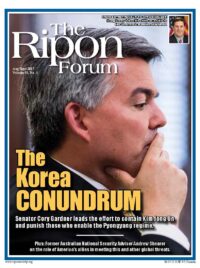 Compared to health care reform, tax reform is easy – or so some were saying a few months ago. Done right, tax reform will be a daunting and divisive undertaking. Republicans shouldn’t view the difficulty as an excuse to retreat from a transformative reform. Rather, they should recognize that the “easy” way out may be the most precarious path. They might as well do the incrementally more difficult – but significantly more rewarding – tax code overhaul the economy needs to break out of the economic rut that has marked this decade.
Compared to health care reform, tax reform is easy – or so some were saying a few months ago. Done right, tax reform will be a daunting and divisive undertaking. Republicans shouldn’t view the difficulty as an excuse to retreat from a transformative reform. Rather, they should recognize that the “easy” way out may be the most precarious path. They might as well do the incrementally more difficult – but significantly more rewarding – tax code overhaul the economy needs to break out of the economic rut that has marked this decade.
As it stands now, the United States has a tax code that is not only outdated, but is harming growth and pushing jobs and capital overseas. Successful tax reform will address the fundamental flaws in the code – high rates, large distortions, and an outdated international tax regime. Fixing these deficiencies will require a real overhaul, an undertaking far more ambitious than just cutting a few tax rates for a short period of time. Both political and policy constraints conspire to heighten the challenge of a successful tax reform, but also provide a pathway to getting the policy “right,” if only policymakers summon the political courage to navigate it.
The last successful tax reform effort was signed into law by a Republican president, fresh off a 49-state electoral sweep, and passed by a divided Congress. There was genuine policy agreement among the tax writers that marginal tax rates were too high while tax sheltering had spiraled out of control. There was good faith among the principal negotiators, representing both parties and the both the executive and legislative branches of government. Despite these tailwinds, the Tax Reform Act of 1986 died many deaths before becoming Public Law 99-514. These favorable conditions do not exist today.
Achieving the economic gains that the right tax reforms can promote is worth going it alone, if necessary.
While congressional Democrats generally claim to be “for tax reform,” they have signaled an underlying disinterest in pursuing pro-growth tax reform. They showed no interest in taking up this task during the Obama administration. There is some recognition by progressives that, at least on the corporate side, the tax code is uncompetitive, but that’s about where the policy agreement ends. It is also unlikely that Democrats will be willing to compromise, on any policy front, to deliver a legislative victory to a weakened president.
Tax reform will have to be a Republican-only initiative – narrowing the scope of the effort to tradeoffs between Republican political and policy priorities. Sure, we all like lower taxes, but there is a yawning divide over how to get there. The business community is deeply divided by competing interests. To wit, lobbyists for the retail industry have mounted the pelt of border-adjustment – a revenue and administrative silver bullet – on their trophy wall. Old capital wants a straight tax cut, while other firms want growth and investment incentives. Every legislator in Congress has a constituency replete with these divided interests. Tax reform, one that fundamentally alters economic incentives, means telling some of these people “no.” Despite it boiling down to being just a Republican effort, the margin for defeat narrows rather than expands.
The political and the policy challenges to tax reform suggest an unlikely path to success. But these very challenges could induce policymakers to do the right thing. If Democrats don’t want to get on board, fine. Achieving the economic gains that the right tax reforms can promote is worth going it alone, if necessary.
Taking the “easy” path to tax reform — tweaking a few rates and calling it a day — will not relieve Congress from making tough choices.
Among Republicans, the major stumbling block is shaping up to be whether to just cut rates for a certain amount of time or go through the painful process of reform. There appears to be some momentum for passing a corporate and middle-class tax cut, adding the cost to the deficit and calling it a day. That seems to be the easy way out. And in some ways, it is – Republicans know how to message a tax cut, and at this point may settle for anything that could be called a legislative achievement. But such minimal short-term gain will not be worth the longer-term costs.
Few people, and even fewer politicians, like to tell people “no.” But taking the “easy” path to tax reform — tweaking a few rates and calling it a day — will not relieve Congress from making tough choices. In fact, failing to take the more difficult path of fundamental tax reform means telling growing businesses that they’re less important than old businesses. It means telling multinational firms to keep money parked overseas or to keep leaving the United States altogether. And it means telling all observers that real, necessary reforms are just too hard for them.
Between a deeply unsatisfying policy outcome that divides Republicans and the business community and a pro-growth tax reform that divides Republicans and the business community, the tough road to reform starts to look a lot more appealing.
Gordon Gray serves as the Director of Fiscal Policy for the American Action Forum.




